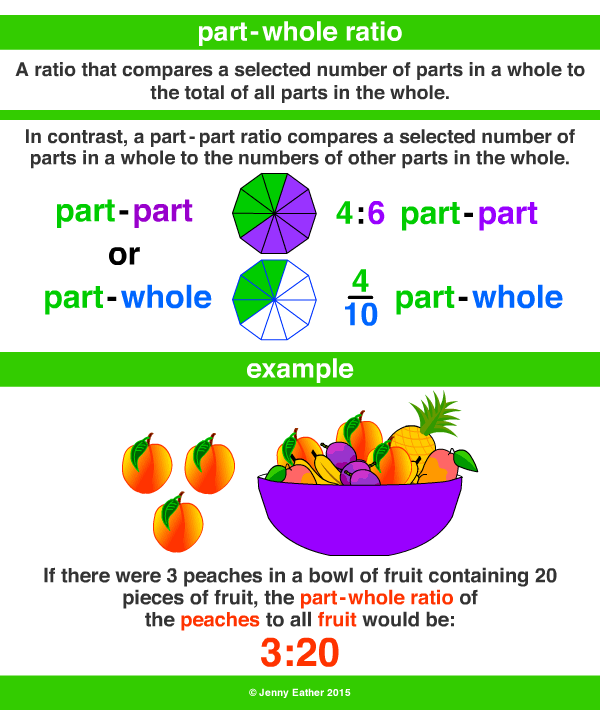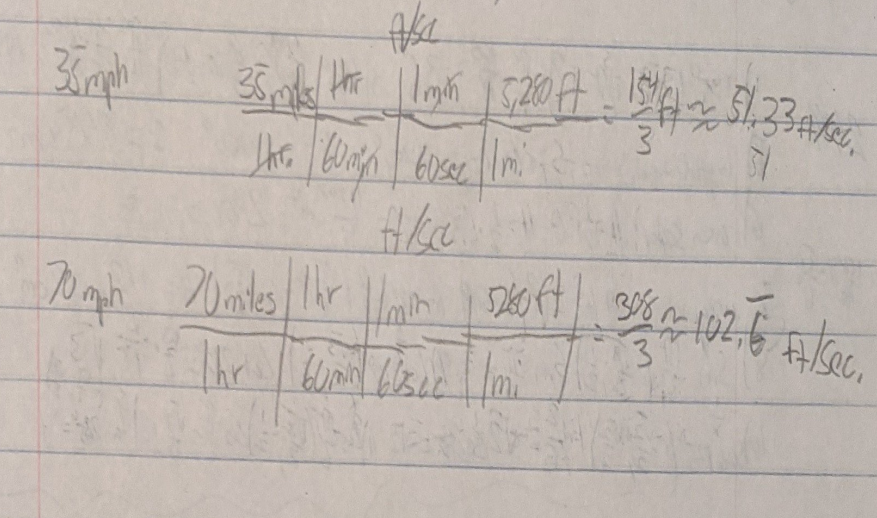Unit 3- Ratios and Rates; Unit 4- Percentages
1/7
There's no tags or description
Looks like no tags are added yet.
Name | Mastery | Learn | Test | Matching | Spaced | Call with Kai |
|---|
No analytics yet
Send a link to your students to track their progress
8 Terms
Ratio: def-
ex. For every 4 apple there are 3 oranges can be written as
-comparison of 2 quantities
4 apples: 3 oranges —> 4:3
4 for every 3
4 to 3
Equivalent Ratios:
two or more ratios that are equal when simplified
ex. 3:9 —> 1:3
-find ratios, factors, multiples
-consider simplifying down to 1
ex. 5 bags tea: 3ml H2O —> 1 bag tea: 3/5 ml H2O
Part-Part ratios:
Part-Whole ratios:
-compares two parts within a whole; shows how one part relates to another part
-a ratio that compares a selected number of parts to the total number of parts in a whole.
ex. 5 red flowers: 10 yellow flowers —> (15 flowers in this ratio)
-How many red flowers if 45 TOTAL flower?
45/15= 3 —> 3×5 red flowers= 15 red flowers

Unit Rates:
-the ratio of two different units, with denominator as 1
-compares a certain number of units of one quantity to units of another quantity. In other words, the second quantity in the comparison is always 1.
ex. Box travels 40miles in 2 hours —> 20miles/ 1 hour
-160 words/4 minutes —> 40 words/ minute
A "unit rate" refers to a rate where the denominator is always 1, meaning it expresses a quantity per single unit of another quantity; while "dimensional analysis" is a method of converting units by multiplying a given quantity by conversion factors, strategically arranged to cancel out the original units and leave you with the desired units
Dimensional analysis:
ex. Convert 35mph to ft/sec
-Convert 70mph to ft/sec
-relates similar measurements to different units through a conversion factor
1)Start with given quantity to the Left
2) Use the conversion factor—> write as Want/ Have
ex. Inches in 37 cm, 1in-2.54cm —> (37cm-given)* (want INCHES/have 2.54cm) conversion factor
ex. 37cm*( 1in/2.54cm)
3) Unit on bottom gets cancelled
*die in the basement
*can also cancel out units on diagonal as seen in mph to ft/sec questions —> just like reducing when multiplying fractions
*tip consider fully converting one unit (ex. hours down to sec) before moving onto the next —> one at a time
ex. CMs cross out —> 37 (inch left over) /2.54= 14.6inches

Percentages: find by dividing
-divide the part by the whole
ex. 9/10 —> 0.9 —> 90%
Convert decimal to % by moving decimal two spots over to the right;
ex. >1.0= >100%, 1.21 —> 121%
Percentage of a whole number:
Fraction Method:
-(Percentage number/ 100)* OF number
ex. 20% of 40 —> (20/100) 40 —>1/5 (40)= 8
Percentage Method:
-make percentage a DECIMAL and multiply OF number
ex. 20% of 40 —> 0.2×40= 8

2 types: of % questions on SAT:
Question 8 is an example of which type?
Question 17?
1) find % of something
vs.
2) finding % LESS/MORE of something
ex. 20% less/more is ACTUALLY asking for 80%
8: 540= 80% OF x —> 540= 0.8x
17: 20% less —> Actually asking for 80% of 40
ex. 8/10 —> 4/5 —> (4/5)*40= 32
-see a %= probably a % question